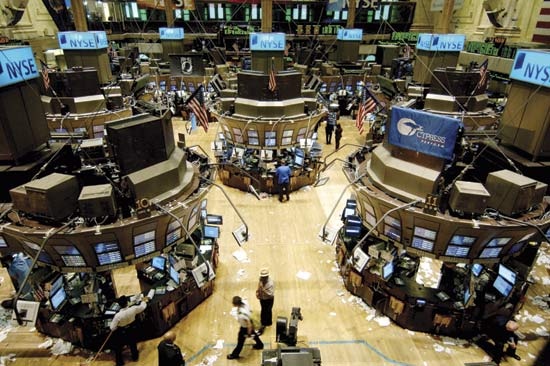capitalism
also called free market economy, or free enterprise economy
 economic system, dominant in the Western world since the breakup of feudalism, in which most of the means of production are privately owned and production is guided and income distributed largely through the operation of markets.
economic system, dominant in the Western world since the breakup of feudalism, in which most of the means of production are privately owned and production is guided and income distributed largely through the operation of markets.A brief treatment of capitalism follows. For full treatment, see economic systems: Market systems (economic systems).
Although the continuous development of capitalism as a system dates only from the 16th century, antecedents of capitalist institutions existed in the ancient world, and flourishing pockets of capitalism were present during the later European Middle Ages. The development of capitalism was spearheaded by the growth of the English cloth industry during the 16th, 17th, and 18th centuries. The feature of this development that distinguished capitalism from previous systems was the use of the excess of production over consumption to enlarge productive capacity rather than to invest in economically unproductive enterprises, such as pyramids and cathedrals. This characteristic was encouraged by several historical events.
In the ethic encouraged by the Protestant Reformation of the 16th century, traditional disdain for acquisitive effort was diminished, while hard work and frugality were given a stronger religious sanction. Economic inequality was justified on the grounds that the wealthy were also the virtuous.
Another contributing factor was the increase in Europe's supply of precious metals and the resulting inflation in prices. Wages did not rise as fast as prices in this period, and the main beneficiaries of the inflation were the capitalists. The early capitalists (1500–1750) also enjoyed the benefits of the rise of strong national states during the mercantilist era. The policies of national power followed by these states succeeded in providing the basic social conditions, such as uniform monetary systems and legal codes, necessary for economic development and eventually made possible the shift from public to private initiative.
 Beginning in the 18th century in England, the focus of capitalist development shifted from commerce to industry. The steady capital accumulation of the preceding centuries was invested in the practical application of technical knowledge during the Industrial Revolution. The ideology of classical capitalism was expressed in Adam Smith's (Smith, Adam) Inquiry into the Nature and Causes of the Wealth of Nations (1776), which recommended leaving economic decisions to the free play of self-regulating market forces. After the French Revolution and the Napoleonic Wars had swept the remnants of feudalism into oblivion, Smith's policies were increasingly put into practice. The policies of 19th-century political liberalism included free trade, sound money (the gold standard), balanced budgets, and minimum levels of poor relief.
Beginning in the 18th century in England, the focus of capitalist development shifted from commerce to industry. The steady capital accumulation of the preceding centuries was invested in the practical application of technical knowledge during the Industrial Revolution. The ideology of classical capitalism was expressed in Adam Smith's (Smith, Adam) Inquiry into the Nature and Causes of the Wealth of Nations (1776), which recommended leaving economic decisions to the free play of self-regulating market forces. After the French Revolution and the Napoleonic Wars had swept the remnants of feudalism into oblivion, Smith's policies were increasingly put into practice. The policies of 19th-century political liberalism included free trade, sound money (the gold standard), balanced budgets, and minimum levels of poor relief.World War I marked a turning point in the development of capitalism. After the war, international markets shrank, the gold standard was abandoned in favour of managed national currencies, banking hegemony passed from Europe to the United States, and trade barriers multiplied. The Great Depression of the 1930s brought the policy of laissez-faire (noninterference by the state in economic matters) to an end in most countries and for a time cast doubt on the capitalist system as a whole. The performance of capitalism since World War II in the United States, the United Kingdom, West Germany, and Japan, however, has given evidence of its continued vitality.
- Clark Gable
- Clark, George Rogers
- Clark, Helen
- Clark, James
- Clark, Joe
- Clark, John Bates
- Clark, John Maurice
- Clark, John Pepper
- Clark, Kenneth Mackenzie Clark, Baron
- Clark, Larry
- Clark L. Hull
- Clark, Marguerite
- Clark, Mark
- Clarksburg
- Clarksdale
- Clark, Septima Poinsette
- Clarkson, Kelly
- Clarkson, Thomas
- Clarksville
- Clark, Tom C.
- Clark University
- Clark, Walter van Tilburg
- Clark, William
- Clark, William Smith
- Clark Wissler